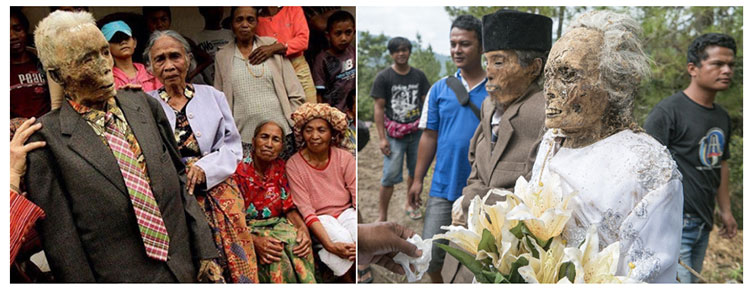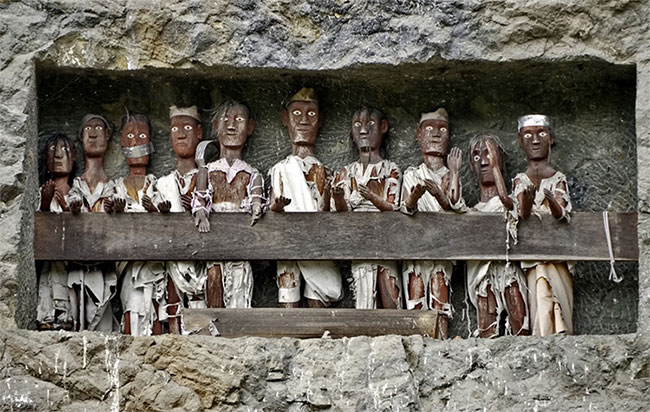Exotic customs are only found in Indonesia
Exposing the dead, stabbing each other in festivals or cutting fingers . Many tribes in Indonesia still circulate ancient, bizarre and very barbaric practices.

Every three years, corpses will be excavated, cleaned, cleaned and dressed.
The Toraja tribe in the Tana Toraja mountains, Sulawesi (Indonesia) has a very strange tradition. They took dead relatives out of the grave and performed Ma'nene rituals. Rituals are a way for Toraja people to show respect for the deceased, even long after the death happened.
Every three years, corpses will be unearthed, washed, cleaned and clothed (usually the most beautiful or loved clothes of the deceased), then walked around the village. After the ceremony, the family will take pictures with that person and bring them back to the grave. The Toraja believe that by doing this, the soul of the deceased will bless them.
The mannequin of the dead (Tau Tau)

Tau Tau is a sculpted effigy made of wood or bamboo representing a dead person.
Also a tradition from Tana Toraja, the Tau Tau is a wooden or bamboo carved figure representing dead people, often like that person and can be found near the grave. The Toraja believe that the soul of the dead will continue to live through the Tau Tau and serve as the guardian of the tomb.
At a grave called Kuburan Batu Lemo, 75 holes in a stone wall are filled by the Tau Tau. This tomb is estimated to have been built in the sixteenth century, the second oldest tomb in Toraja.
Buried babies die in tree holes (Passiliran)

If the children Toraja died before six months of age, parents would wrap Enau leaves and bury the body inside the hole of a Tarr tree.
The Toraja people also have a small cemetery at the base of the tree. For them, children under six months old (and without teeth) are considered sacred. So if babies Toraja die before six months, parents will wrap Enau leaves and bury the body inside the hole of a Tarra tree, symbolizing the baby's return to the womb. Although this tradition is gradually disappearing, these little tombs can still be found in Tana Toraja as a way of preserving culture.
Ceremonial bathing ceremony (Nyobeng)

This tribe believed that human dry skulls had powerful spells for good harvests.
In addition to the custom of digging the bodies of relatives, the Dayak tribe has a tradition of bathing the skulls of village enemies. This strange, monstrous but horrifying rite is called Nyobeng. From many years ago, the Dayak collected human skulls killed in Mengayau (keep hunting the enemies, other tribesmen). Every year, they performed the Nyobeng ceremony to bathe and clean those skulls
This tribe believed that human dry skulls had powerful magic that helped harvest crops and ward off evil spirits. Despite being banned by the government, the Nyobeng ritual continued as a way of expressing gratitude for good harvests.
The custom shows people dead in bamboo cages on Bali Island (Trunyan Cemetery)

Exposure to dead people in bamboo cages is only for married people.
Trunyan, the mountain village on the eastern shore of Lake Batur is the only place in Bali that still holds this ancient ritual. When a person in the village dies, the body is not buried or burnt but placed in a bamboo cage for self-decomposition. Until all the flesh disintegrates, the skull is removed from the rest of the skeleton and placed on a stone altar beneath a sacred tree.
Exposure to dead people in bamboo cages is only for married people. Those who died before marriage, simply buried. Trunyan Cemetery, where bamboo cages are located near the village but traditionally, only men can go to this cemetery, after crossing Lake Batur by boat.
Customary cut fingers (Ikipalin)

The women Dani performed the ritual to cut off their fingers after the death of a loved one.
Taking place in Papua (province of Western New Guinea, Indonesia), an unbelievable ritual exists in the Dani tribe. The women Dani performed Ikipalin, the ritual of truncating the finger after the death of a loved one. Dani believes that unhappiness due to the death of a family member can be removed by amputating fingers.
Dani people attach great importance to the deceased, especially the family members. They also conceive, the death of relatives is not only a mental pain but also a physical pain. Ikipalin symbolizes that pain. Dani people have maintained this tradition for thousands of years and have no intention of changing or leaving.
Ceremony of dressing up water buffaloes (Kebo Keboan)

Kebo Keboan is a ritual to pray for rain and protection from gods.
Every culture or religion has a unique way to offer devotion to the gods. And the particularly bizarre custom in Banyuwangi involves impersonating a water buffalo. Every month Muharram or Suro follows the Javanese calendar, 'water buffaloes' will roam the village streets.
In fact, these 'water buffaloes' are just men smearing with coal or oil, wearing horns and bells around their necks. Then, they marched and danced excitedly through village roads. Kebo Keboan is a ritual to pray for rain and protection from gods. Men dressed as water buffalo, the most sacred and powerful animal in agriculture, symbolize power.
Bloody harvest festival (Pasola)

Despite the risks, the Sumba believe that pain and blood are never wasted.
The remote Sumba Island, where you can witness a particularly bloody Thanksgiving ceremony called Pasola, an ancient war rite made by Sumba men. Twice a year, the Sumba villages meet and hold a war between horse-riding warriors, throwing large wooden spears together.
Although the wood is quite blunt, it can still cause serious injuries and even injuries and lead to death. Despite the risks, the Sumba believe that pain and blood are never wasted. They believe that blood spilling on land will ensure a more plentiful harvest in the future. Many visitors come to Sumba just to see this festival.

On Mentawai Island, vampire-like sharp teeth are said to be the standard of beauty.
On Mentawai Island, vampire-like sharp teeth are said to be the standard of beauty. Here, a woman with more attractive sharp teeth will be happier and peaceful for the rest of her life than normal, square teeth.
Using rough grinding steel or wood, the village chief will sharpen and etch the woman's teeth. The ritual can last for hours because every tooth needs to be shaved perfectly to get a sharp tip. Non-sterile grinding tools, rituals do not use any anesthetic, the Mentawa woman must endure the pain to become what is considered beautiful. They believe that pain is only temporary, but happiness will last forever.
- The strange sex customs in the world
- Pig monster has an odd appearance in Indonesia
- Marvel at the 1-0-2 customs of countries around the world
- The island where the son is taught by the older sister how to
- Unusual magical customs in the world
- The 10 most incredible customs in the world
- List of the most bizarre Christmas customs in the world
- Scientific explanation for painful customs with girls in Africa
- Strange customs of 'living with the dead' in Indonesia
- Customs clearance after reaching the moon
- The most exotic wedding customs in the world
- Strangely, the husband-wife land is allowed to have sex with his wife's sister
 'Fine laughs' - Scary and painful torture in ancient times
'Fine laughs' - Scary and painful torture in ancient times The sequence of numbers 142857 of the Egyptian pyramids is known as the strangest number in the world - Why?
The sequence of numbers 142857 of the Egyptian pyramids is known as the strangest number in the world - Why? Miracle behind the world's largest stone Buddha statue
Miracle behind the world's largest stone Buddha statue What is alum?
What is alum?